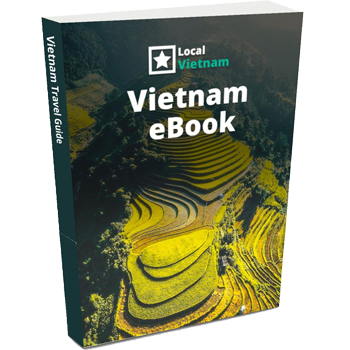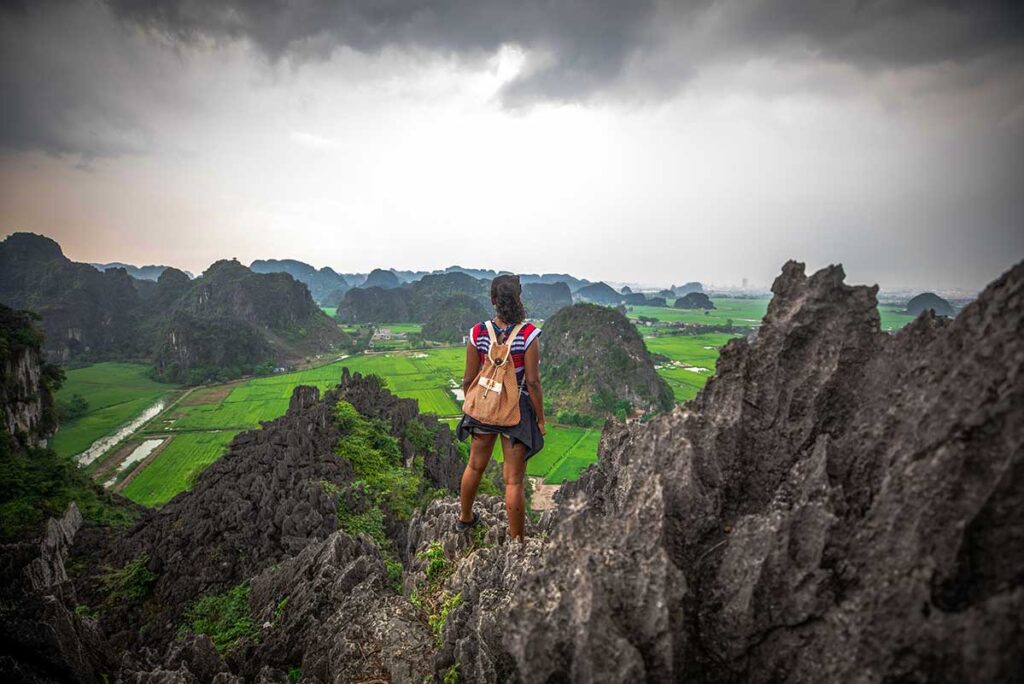Vietnamese holiday calendar
In daily life, Vietnamese people follow the standard 12-month calendar, also known as the Gregorian calendar, which is widely used around the world. Most modern-day activities, including official business, school schedules, and public holidays, are aligned with this calendar.
However, many of Vietnam’s traditional holidays and festivals are based on the lunar calendar (also called the moon calendar). The lunar calendar, influenced by ancient traditions, follows the phases of the moon, meaning that major celebrations often align with the full moon or new moon phases.
Because the lunar calendar operates differently from the Gregorian calendar, these holidays fall on different dates each year. For example, Tet (Vietnamese Lunar New Year) and the Mid-Autumn Festival are celebrated annually, but their dates shift based on the lunar cycle. This variability is something to keep in mind when planning trips around Vietnamese events.
Additionally, the origins of some of these holidays and festivals can be traced back to Chinese influence during periods of colonization, which shaped aspects of Vietnamese culture, traditions, and even the lunar calendar practices.
Western influences on Vietnamese holidays
While most Vietnam national holidays are deeply rooted in local history and traditions, some holidays are not originally Vietnamese but are celebrated due to Western influences. Events like Christmas and New Year’s Eve have gained popularity, particularly in urban areas like Hanoi, Ho Chi Minh City, and other cities with strong economic ties or tourism development. These holidays are often marked by festive decorations, gatherings, and celebrations similar to those seen in Western countries.
Although not officially recognized as national holidays, they provide a glimpse into Vietnam’s ability to blend local culture with global traditions, creating a unique and modern celebration style.
January: Holidays & Events
January marks the start of the year and is one of the most eventful months in Vietnam. While the weather varies by region, the north experiences cooler, misty conditions, central Vietnam has pleasant temperatures, and the south enjoys warm, dry weather. For a detailed guide to January’s weather, check out our Vietnam January weather guide.
Culturally, January is significant because of Tet preparations, as families across the country start getting ready for the biggest holiday of the year, the Vietnamese Lunar New Year.
Dalat Flower Festival
Date: Biennial event (late December to early January on odd-numbered years)
This vibrant festival in Dalat showcases the city’s reputation as the “City of Flowers.” Expect stunning floral displays, parades, and exhibitions throughout the city.
Travel Tip: Book accommodations early as Dalat gets very crowded during this time. Explore the Dalat Flower Festival guide for detailed tips.
Tet (Vietnamese Lunar New Year)
Date: Late January or early February (lunar calendar)
Tet is Vietnam’s most important celebration, marking the start of the lunar calendar. Families clean their homes, prepare traditional foods, and honor their ancestors. Streets are filled with festive decorations, including red banners and kumquat trees.
Travel Tip: While Tet is fascinating to witness, it’s also challenging for travelers. Many businesses close, and transportation can be fully booked. Plan ahead and read our complete guide to Tet.
February: Holidays & Events
February is an eventful month in Vietnam, often hosting Tet if it falls later in the lunar calendar. The weather remains cool in the north and warm in the south, making it a pleasant time to explore Vietnam. For detailed weather information, check the Vietnam February weather guide.
Tet (Vietnamese Lunar New Year)
Date: Late January or early February (lunar calendar)
Tet may fall in February depending on the lunar calendar. For a detailed description of Tet, its traditions, and travel tips, please refer to the Tet Holiday section in January.
Dong Da Festival (Quang Trung Emperor’s Day)
Date: Fifth day of the first lunar month (Late January or February, lunar calendar)
This festival honors Emperor Quang Trung, a national hero who defeated the Chinese Qing army in 1789. Celebrations include processions, martial arts displays, and ceremonies, particularly in Hanoi’s Dong Da District, where the historic battle took place.
March: Holidays & Events
March is a transitional month, with warmer weather arriving in the north and continued dry conditions in the south. This is a great time for outdoor activities like trekking in Sapa or exploring the Mekong Delta. For detailed weather information, visit the Vietnam March weather guide.
International Women’s Day
Date: March 8th
This day celebrates the contributions of women in Vietnam. Many families and workplaces give flowers and gifts to the women in their lives. Schools and offices often hold small ceremonies or events.
Travel Tip: While it’s not a public holiday, you might see vibrant flower displays in major cities, and it’s a wonderful cultural experience.
Holiday of the Dead (Thanh Minh)
Date: Late March or early April (lunar calendar)
Similar to the Qingming Festival in China, families visit ancestral graves to clean and pay respects. Offerings of food and incense are common during this solemn occasion.
Travel Tip: While not a tourist-centric event, it’s an insightful glimpse into Vietnam’s cultural emphasis on family and ancestors. Temples and cemeteries may be crowded during this time.
April: Holidays & Events
April is a vibrant month in Vietnam, with warm weather spreading across the country. The north experiences the arrival of spring blooms, while central and southern regions remain dry and sunny. For detailed weather tips, visit our Vietnam April weather guide.
Hung Kings’ Festival (Giỗ Tổ Hùng Vương)
Date: 10th day of the 3rd lunar month (March or April, lunar calendar)
As one of Vietnam’s oldest traditions, this festival continues into April in certain years. Ceremonies take place at Hung King temples, with Phu Tho Province being the center of celebrations.
Travel Tip: If you missed this in March, catch it in April, especially in northern Vietnam. Expect crowds and limited accommodations near the temples.
Reunification Day (Victory Day)
Date: April 30th
This national holiday marks the fall of Saigon in 1975, symbolizing the reunification of North and South Vietnam. Celebrations include parades, flag-raising ceremonies, and fireworks in major cities.
Travel Tip: If you’re in Ho Chi Minh City, this is a significant day. However, public transport may be limited, and attractions can be crowded.
May: Holidays & Events
May ushers in hotter weather, especially in the south, while northern regions experience the first signs of summer. The central highlands are still a great option for cooler escapes. For more insights, visit our Vietnam May weather guide.
International Labor Day
Date: May 1st
This is a major public holiday in Vietnam, with workers and families enjoying a day off. Parades and labor-focused events occur in major cities.
Travel Tip: Many locals take short vacations during this time, so transportation and accommodations can be busy.
June: Holidays & Events
June is the start of summer in Vietnam, with hot and humid weather in most parts of the country. Coastal areas such as Nha Trang and Da Nang are particularly popular for beachgoers. For a detailed weather guide, check out our Vietnam June weather guide.
Buddha’s Birthday (Phật Đản)
Date: 15th day of the 4th lunar month (usually falls in May or June) This holiday celebrates the birth, enlightenment, and passing of the Buddha. Vietnamese Buddhists commemorate the occasion with colorful parades, temple visits, and offerings of flowers and food.
Travel Tip: Visiting a Buddhist temple during this time is a great cultural experience, but expect large crowds. The celebrations are particularly vibrant in cities like Hue and Ho Chi Minh City.
July: Holidays & Events
July continues the hot summer weather in Vietnam, with some areas in the central region becoming very dry. Despite the heat, this month offers unique cultural experiences. For more details, see our Vietnam July weather guide.
Wandering Souls Day (Vu Lan)
Date: 15th day of the 7th lunar month (usually July or August) This solemn holiday honors ancestors and wandering souls. Families visit graves, offer food and incense, and perform ceremonies to help wandering spirits find peace.
Travel Tip: Cemeteries and temples may be crowded, but it’s a meaningful time to witness the deep respect Vietnamese people have for their ancestors.
August: Holidays & Events
August marks the tail end of summer, with occasional rains and cooler evenings in some regions. It’s a transitional month for both the weather and cultural activities. For a complete guide, visit our Vietnam August weather guide.
Mid-Autumn Festival (Tết Trung Thu)
Date: 15th day of the 8th lunar month (usually falls in September but can occasionally be in August) This festival celebrates family and the harvest. Streets are filled with colorful lanterns, lion dances, and stalls selling mooncakes.
Travel Tip: Hanoi’s Old Quarter and Ho Chi Minh City’s Chinatown are particularly lively during this time. Try mooncakes and enjoy the festive atmosphere.
September: Holidays & Events
September marks the beginning of autumn in northern Vietnam, with cooler temperatures and less rain. The central and southern regions remain warm, but occasional rains bring a refreshing change. For more weather insights, check our Vietnam September weather guide.
National Day (Independence Day)
Date: September 2nd
This is one of Vietnam’s most significant public holidays, celebrating the country’s independence declared by Ho Chi Minh in 1945. Celebrations include parades, cultural performances, and fireworks, particularly in major cities like Hanoi and Ho Chi Minh City.
Travel Tip: National Day is a great time to witness Vietnamese patriotism. Expect large crowds and limited public transport in major cities.
Mid-Autumn Festival (Tết Trung Thu)
Date: 15th day of the 8th lunar month (usually September, but occasionally in August)
This festival celebrates family and the harvest. Streets come alive with lantern parades, lion dances, and mooncake stalls.
Travel Tip: Hanoi’s Old Quarter and Ho Chi Minh City’s Chinatown are particularly festive. Try mooncakes and join the lively celebrations.
October: Holidays & Events
October is an ideal time to visit Vietnam, especially the north, where autumn is in full swing with clear skies and cooler weather. Central Vietnam sees the beginning of its rainy season, while the south remains warm and dry. Learn more in our Vietnam October weather guide.
Vietnamese Women’s Day
Date: October 20th
This day honors the contributions of women in Vietnamese society. Families and workplaces celebrate by giving flowers and gifts to women, and there are often cultural performances and events.
Travel Tip: While not a public holiday, you might notice flower shops and gift stores bustling with activity.
November: Holidays & Events
November offers pleasant weather across Vietnam, with cooler temperatures in the north and dry, sunny days in the south. This is an excellent time for outdoor adventures and exploring Vietnam’s landscapes. For a detailed guide, visit our Vietnam November weather guide.
Teacher’s Day (Ngày Nhà Giáo Việt Nam)
Date: November 20th
This day honors educators, with students and families presenting gifts and flowers to teachers. Schools often hold small celebrations.
Travel Tip: While not a public holiday, this is a great time to learn about Vietnam’s respect for education and educators.
December: Holidays & Events
December marks the start of winter in northern Vietnam, with cooler temperatures and misty days. Central Vietnam sees the end of its rainy season, and the south experiences dry, sunny weather, making it a popular time for tourists. For more weather details, visit our Vietnam December weather guide.
Christmas (Giáng Sinh)
Date: December 24th-25th
Though not an official public holiday, Christmas is widely celebrated in urban areas of Vietnam due to Western influences. Churches hold midnight masses, and major cities like Hanoi, Ho Chi Minh City, and Da Nang are adorned with festive lights, Christmas trees, and decorations.
Travel Tip: Visit cathedrals like St. Joseph’s Cathedral in Hanoi or Notre-Dame Cathedral in Ho Chi Minh City for a festive atmosphere. Restaurants and hotels often offer Christmas dinners.


